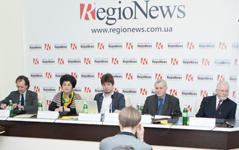Press-Conference “Colony loss can turn into a disaster for human kind. Experts from 20 countries are coming to Kyiv to prevent this danger”
15 April, 2013 The Organizing Committee of the XXXXIII International Apicultural Congress conducted a press-conference “Colony loss can turn into a disaster for human kind. Experts from 20 countries are coming to Kyiv to prevent this danger” on 15 April 2013 in the premises of the News Agency RegioNews, Kyiv, 10-B, Khreshchatyk str., of. 8.
The Organizing Committee of the XXXXIII International Apicultural Congress conducted a press-conference “Colony loss can turn into a disaster for human kind. Experts from 20 countries are coming to Kyiv to prevent this danger” on 15 April 2013 in the premises of the News Agency RegioNews, Kyiv, 10-B, Khreshchatyk str., of. 8.
The President of the International Federation of Beekeeping Associations Apimondia, Mr. Gilles Ratia, the President of the Organizing Committee of the XXXXIII International Apicultural Congress, Mrs. Tetiana Vasylkyvska, the Secretary General of the International Federation of Beekeeping Associations Apimondia, Mr. Riccardo Jannoni-Sebastianini, the President of the Scientific Commission Bee Biology, Prof. Dr. Karl Crailsheim, and the Communication Coordinator of the Organizing Committee of the XXXXIII International Apicultural Congress, Mr. Yuriy Riphyak, participated in the press-conference. The Secretary of the IFBA Apimondia, Mr. Filippo Jannoni-Sebastianini, and the President of the Regional Commission Okeania, Ms. Maureen Maxwell, were present at the Press-Conference in the capacity of the honored guests.
The Communication Coordinator of the Organizing Committee, Mr. Yurij Riphyak, was the moderator of the event. He presented the participants and guests of the Press-Conference to the journalists.
The event and the topical issue discussed attracted the attention of the Mass Media. The journalist were present at the Press-Conference as follows: Yana Koretska (5th channel), Olga Paroschuk (IA “Agro News”), Oleksandr Brodsky and Orest Kogut (newspaper “The development of environment”), Volodymyr Tarasiuk (magazine “Agroworld of Ukraine”), Olga Skotnikova (First National Channel), Oleksiy Sopilniak and Yulia Menel (ICTV) and others.
The danger of bee extinction is one of the most topical ecological issues of the modern world, the bees not only being a source of bee products but also playing key role in plants pollination. The ways of solving these problems will be widely discussed at the XXXXIII Internationa; Apicultural Congress to be held in Kyiv in September – October 2013 and will become a landmark event for both Ukraine and world.
The President of the XXXXIII International Apicultural Congress, the President of the Organizing Committee of the XXXXIII International Apicultural Congress, Mrs. Tetiana Vasylkivska, answering the question “What is Apimondia Congress and what key factors should we know about it?” spoke about Apimondia Congresses, about the XXXXIII International Apicultural Congress to be held in Kyiv in September – October 2013, and about the uneasy struggle of 2 Ukrainian NGOs “Brotherhood of Ukrainian Beekeepes” and “Union of Ukrainian Beekeepers” for the right to hold the Congress in Ukraine. She also pointed out the objectives and the tasks of the main Congress Programs.
The next question “The history and significance of the IFBA Apimondia and its Congress” was addressed to the Secretary General of the International Federation of Beekeeping Associations Apimondia, Mr. Riccardo Jannoni-Sebastianini, who spoke about the history of Apimondia and the Congresses emphasizing that Apimondia Congresses are the platforms for scientific, production, business contacts and the beekeepers from all around the world, they provide opportunities for beekeeping specialists to exchange their experience, to find the perspectives for future cooperation and to present themselves globally.
The President of Apimondia, Mr. Gilles Ratia, answering the question “The place of Ukraine in global beekeeping and the assessment of the level of the preparation of the XXXXIII International Apicultural Congress by the Organizing Committee” noted the powerful positions of Ukraine in global beekeeping due to a substantial quantity of beekeepers, namely over 400 000, and gross annual output up to 75 000 tons. Apimondia President told about the organization of the XXXXIII International Apicultural Congress in Ukraine, expressed his admiration of the professionalism of the members of the Organizing Committee of the XXXXIII International Apicultural Congress, his satisfaction with the work of the Organizing Committee and his assurance in successful holding of the Congress in Ukraine.
Mr. Yurij Riphyak asked Mr. President the key question of the Press Conference: “What is actually happening with the bees? Why do we have the phenomena of the colony loss”. Gilles Ratia said that the problem was not new, but as per moment the scope of the problem is real drastical: up to 40% of bee mortality is observed in many countries of the world. He pointed out 2 main factors: intensive agriculture and intensive apiculture. One of the ways to prevent colony loss is to change the approach to cultivation of crops and to apply the principles of organic agriculture and to organic apiculture. The President specially emphasized the necessity of comprehensive approach to solving these problems which comprises many different lines of work.
The President of the Scientific Commission of Apimondia “Bee Biology”, Prof. Dr. Karl Crailsheim, answering the question “Can Apis Mellifera be considered the endangered species and how can Kyiv Congress prevent this?” emphasized the uniqueness of bees being both wild and domestic animals. He said that according to the international standards bees as wild animals are endangered species. Bees are vitally important to humankind, because they are the source of valuable bee products and at the same time they are an inalienable part of many ecological systems, being the pollinators of entomophily plants.
Entomophily plants are plants pollinated by insects, mainly bees and bumblebees. The third of the products of plant origin, which we eat on a daily basis, is a result of the hard work of bees. These are: buckwheat, cucumber, sunflower, apple, pear, cherry, plum, watermelon and many others. Moreover bees play major role in pollinating cattle food crops.
Unfortunately the bees have been disappearing in many countries of the world over the recent years. Bee families are abandoning their beehives, leaving behind the capped brood, the food stores of both honey and bee pollen, and bee queen. Such behavior is unnatural for Apis Mellifera. The place where the family goes is unknown. If bees live the beehive without the bee queen, they are doomed.










